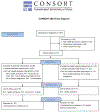Randomized, Controlled Trial of Exercise on Objective and Subjective Sleep in Parkinson's Disease
- PMID: 32092190
- PMCID: PMC8826749
- DOI: 10.1002/mds.28009
Randomized, Controlled Trial of Exercise on Objective and Subjective Sleep in Parkinson's Disease
Abstract
Background: Sleep dysfunction is common and disabling in persons with Parkinson's Disease (PD). Exercise improves motor symptoms and subjective sleep quality in PD, but there are no published studies evaluating the impact of exercise on objective sleep outcomes. The goal of this study was to to determine if high-intensity exercise rehabilitation combining resistance training and body-weight interval training, compared with a sleep hygiene control improved objective sleep outcomes in PD.
Methods: Persons with PD (Hoehn & Yahr stages 2-3; aged ≥45 years, not in a regular exercise program) were randomized to exercise (supervised 3 times a week for 16 weeks; n = 27) or a sleep hygiene, no-exercise control (in-person discussion and monthly phone calls; n = 28). Participants underwent polysomnography at baseline and post-intervention. Change in sleep efficiency was the primary outcome, measured from baseline to post-intervention. Intervention effects were evaluated with general linear models with measurement of group × time interaction. As secondary outcomes, we evaluated changes in other aspects of sleep architecture and compared the effects of acute and chronic training on objective sleep outcomes.
Results: The exercise group showed significant improvement in sleep efficiency compared with the sleep hygiene group (group × time interaction: F = 16.0, P < 0.001, d = 1.08). Other parameters of sleep architecture also improved in exercise compared with sleep hygiene, including total sleep time, wake after sleep onset, and slow-wave sleep. Chronic but not acute exercise improved sleep efficiency compared with baseline.
Conclusions: High-intensity exercise rehabilitation improves objective sleep outcomes in PD. Exercise is an effective nonpharmacological intervention to improve this disabling nonmotor symptom in PD. © 2020 International Parkinson and Movement Disorder Society.
Keywords: Parkinson's disease; exercise; polysomnography; rehabilitation; sleep.
© 2020 International Parkinson and Movement Disorder Society.
Conflict of interest statement
Figures



Comment in
-
Exercise and Sleep in Parkinson's Disease.Mov Disord. 2020 Jun;35(6):918-920. doi: 10.1002/mds.28032. Mov Disord. 2020. PMID: 32562460 No abstract available.
-
Reply to: Exercise for "Sleep Rehabilitation" in Parkinson's Disease.Mov Disord. 2020 Jul;35(7):1286. doi: 10.1002/mds.28132. Mov Disord. 2020. PMID: 32691908 No abstract available.
-
Exercise for "Sleep Rehabilitation" in Parkinson's Disease.Mov Disord. 2020 Jul;35(7):1285. doi: 10.1002/mds.28136. Mov Disord. 2020. PMID: 32691909 No abstract available.
References
-
- Barone P, Antonini A, Colosimo C, et al. The PRIAMO study: A multicenter assessment of nonmotor symptoms and their impact on quality of life in Parkinson’s disease. Mov Disord. 2009;24(11):1641–1649. - PubMed
-
- Politis M, Wu K, Molloy S, P GB, Chaudhuri KR, Piccini P. Parkinson’s disease symptoms: the patient’s perspective. Mov Disord. 2010;25(11):1646–1651. - PubMed
-
- Lees AJ, Blackburn NA, Campbell VL. The nighttime problems of Parkinson’s disease. Clin Neuropharmacol. 1988;11(6):512–519. - PubMed
-
- Nausieda PA, Weiner WJ, Kaplan LR, Weber S, Klawans HL. Sleep disruption in the course of chronic levodopa therapy: an early feature of the levodopa psychosis. Clin Neuropharmacol. 1982;5(2):183–194. - PubMed
Publication types
MeSH terms
Grants and funding
LinkOut - more resources
Full Text Sources
Other Literature Sources
Medical
Research Materials

